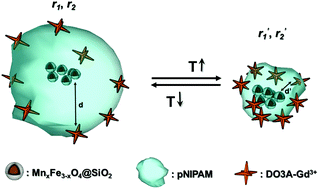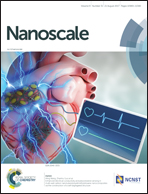Probing T1–T2 interactions and their imaging implications through a thermally responsive nanoprobe†
Abstract
The complex and specialised diagnostic process through magnetic resonance imaging (MRI) could be simplified with the implementation of dual T1–T2 contrast agents. T1- and T2-weighted MR are compatible modalities, and co-acquisition of contrast enhanced images in both T1 and T2 will drastically reduce artefacts and provide double-checked results. To date, efforts in the development of dual MRI probes have provided inconsistent results. Here we present the preparation and relaxometric study of a dual T1–T2 MRI probe based on superparamagnetic nanoparticles, paramagnetic Gd3+ chelates and pNIPAM (poly(N-isopropylacrylamide)), in which the distance between paramagnetic and superparamagnetic species can be modulated externally via temperature variations. Such a probe alleviates traditional nanotechnology limitations (e.g. batch to batch variability) as comparisons can be established within a single probe.



 Please wait while we load your content...
Please wait while we load your content...